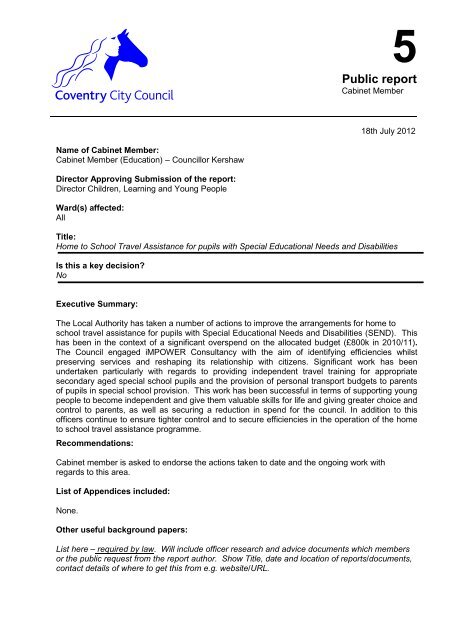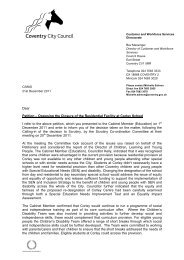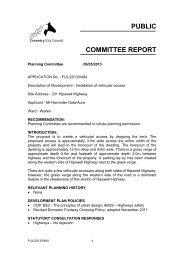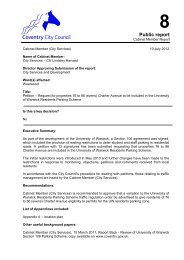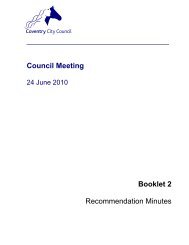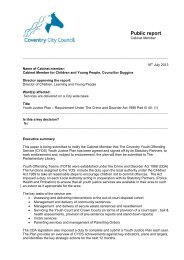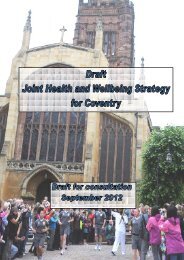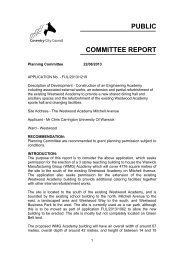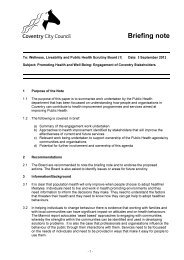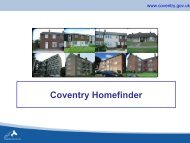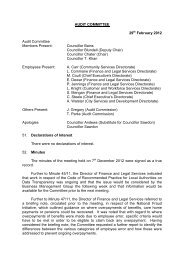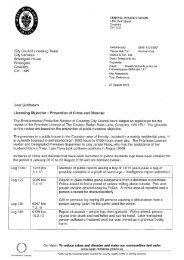Home to School Travel Assistance for pupils with Special ...
Home to School Travel Assistance for pupils with Special ...
Home to School Travel Assistance for pupils with Special ...
Create successful ePaper yourself
Turn your PDF publications into a flip-book with our unique Google optimized e-Paper software.
5<br />
Public report<br />
Cabinet Member<br />
18th July 2012<br />
Name of Cabinet Member:<br />
Cabinet Member (Education) – Councillor Kershaw<br />
Direc<strong>to</strong>r Approving Submission of the report:<br />
Direc<strong>to</strong>r Children, Learning and Young People<br />
Ward(s) affected:<br />
All<br />
Title:<br />
<strong>Home</strong> <strong>to</strong> <strong>School</strong> <strong>Travel</strong> <strong>Assistance</strong> <strong>for</strong> <strong>pupils</strong> <strong>with</strong> <strong>Special</strong> Educational Needs and Disabilities<br />
Is this a key decision?<br />
No<br />
Executive Summary:<br />
The Local Authority has taken a number of actions <strong>to</strong> improve the arrangements <strong>for</strong> home <strong>to</strong><br />
school travel assistance <strong>for</strong> <strong>pupils</strong> <strong>with</strong> <strong>Special</strong> Educational Needs and Disabilities (SEND). This<br />
has been in the context of a significant overspend on the allocated budget (£800k in 2010/11).<br />
The Council engaged iMPOWER Consultancy <strong>with</strong> the aim of identifying efficiencies whilst<br />
preserving services and reshaping its relationship <strong>with</strong> citizens. Significant work has been<br />
undertaken particularly <strong>with</strong> regards <strong>to</strong> providing independent travel training <strong>for</strong> appropriate<br />
secondary aged special school <strong>pupils</strong> and the provision of personal transport budgets <strong>to</strong> parents<br />
of <strong>pupils</strong> in special school provision. This work has been successful in terms of supporting young<br />
people <strong>to</strong> become independent and give them valuable skills <strong>for</strong> life and giving greater choice and<br />
control <strong>to</strong> parents, as well as securing a reduction in spend <strong>for</strong> the council. In addition <strong>to</strong> this<br />
officers continue <strong>to</strong> ensure tighter control and <strong>to</strong> secure efficiencies in the operation of the home<br />
<strong>to</strong> school travel assistance programme.<br />
Recommendations:<br />
Cabinet member is asked <strong>to</strong> endorse the actions taken <strong>to</strong> date and the ongoing work <strong>with</strong><br />
regards <strong>to</strong> this area.<br />
List of Appendices included:<br />
None.<br />
Other useful background papers:<br />
List here – required by law. Will include officer research and advice documents which members<br />
or the public request from the report author. Show Title, date and location of reports/documents,<br />
contact details of where <strong>to</strong> get this from e.g. website/URL.
Changing Behaviours – Opening a new conversation <strong>with</strong> the citizen. Nigel Keohane.<br />
Website: www.nlgn.org.uk.<br />
Has it been or will it be considered by Scrutiny?<br />
No<br />
Has it been or will it be considered by any other Council Committee, Advisory Panel or<br />
other body?<br />
No:<br />
Will this report go <strong>to</strong> Council?<br />
No<br />
2
Report title: <strong>Home</strong> <strong>to</strong> <strong>School</strong> <strong>Travel</strong> <strong>Assistance</strong> <strong>for</strong> <strong>pupils</strong> <strong>with</strong> <strong>Special</strong> Educational Needs<br />
and Disabilities<br />
1. Context (or background)<br />
.<br />
1.1 The Children, Learning and Young People's direc<strong>to</strong>rate has continued <strong>to</strong> work <strong>to</strong> identify<br />
ways in which home <strong>to</strong> school transport might be better managed, offer better outcomes<br />
<strong>for</strong> children and young people and provide greater choice and control <strong>for</strong> parents. A range<br />
of measures <strong>to</strong> improve the budgetary position of the <strong>Special</strong> Educational Needs transport<br />
budget have been taken <strong>for</strong>ward.<br />
2. Options considered and recommended proposal<br />
2.1 A range of measures <strong>to</strong> improve the budgetary position of the <strong>Special</strong> Educational Needs<br />
(SEN) <strong>Home</strong> <strong>to</strong> <strong>School</strong> Transport budget have been taken. These include:<br />
tighter decision making and linking responsibility <strong>for</strong> the budget <strong>with</strong> the manager<br />
of the team who makes the decisions on placement <strong>for</strong> <strong>pupils</strong> <strong>with</strong> SEND<br />
significant work has been undertaken <strong>with</strong> colleagues in procurement around the<br />
tendering process, <strong>with</strong> the use of e-tenders. Three special schools in the city -<br />
Corley, Castle Wood and Three Spires - each have a single provider <strong>for</strong> the<br />
school which also supports better communication between the school and the<br />
single contrac<strong>to</strong>r.<br />
Joint working between SEN Management Services and the <strong>Travel</strong> Bureau <strong>to</strong><br />
ensure that routing is as efficient as possible<br />
The greater involvement of special school headteachers <strong>to</strong> ensure efficiencies<br />
The changed arrangements <strong>to</strong> support nursery aged <strong>pupils</strong> <strong>with</strong> SEN following the<br />
closure of the two enhanced resource nurseries in July 2011 which has resulted<br />
in savings of £0.1m in a full financial year).<br />
2.2 The City Council also commissioned support from Impower consultancy <strong>with</strong> the aim of<br />
identifying efficiencies whilst preserving services and reshaping its relationship <strong>with</strong><br />
citizens. Focus groups of parents <strong>with</strong> <strong>pupils</strong> <strong>with</strong> SEND were held <strong>to</strong> seek their views and<br />
look <strong>for</strong> new ways of working. Following this work two key work streams were established<br />
<strong>to</strong> take <strong>for</strong>ward the provision of Independent <strong>Travel</strong> Training (ITT) and Personal Transport<br />
Budgets.<br />
2.3 An additional Independent <strong>Travel</strong> Trainer was appointed <strong>to</strong> the <strong>Travel</strong> Training Team<br />
based in Community Services. Two staff now focus their work on school aged <strong>pupils</strong>. The<br />
aim is <strong>to</strong> support young people <strong>to</strong> improve their independence skills which also reduces the<br />
number of adults needing training in subsequent years. This work initially focussed on<br />
<strong>pupils</strong> attending Alice Stevens <strong>Special</strong> <strong>School</strong>. 26 <strong>pupils</strong> were successfully trained in the<br />
second half of the academic year 2010/11 and 31 <strong>pupils</strong> have been travel trained <strong>to</strong> date<br />
this academic year. ITT is now also being undertaken at Woodfield and Sherbourne Fields<br />
<strong>Special</strong> <strong>School</strong>s <strong>for</strong> appropriate young people in those schools. Savings of £0.3m pa are<br />
<strong>for</strong>ecast by 2013-14.<br />
2.4 The Local Authority also developed a scheme <strong>to</strong> offer Personal Transport Budgets <strong>to</strong><br />
parents. A Personal Transport Budget (PTB) is an amount of money provided <strong>to</strong> parents of<br />
<strong>pupils</strong> <strong>with</strong> SEND who are eligible <strong>for</strong> travel assistance, in lieu of council transport<br />
provision. They are designed <strong>to</strong> be voluntary, tailored and non-prescriptive. They also<br />
financially benefit parents who can negotiate better deals locally, joint commission and<br />
spend money more imaginatively.<br />
2.5 Following financial modelling a level of PTB was established. Parents of <strong>pupils</strong> at Castle<br />
Wood were used as a "pilot" which proved that an appetite <strong>for</strong> PTBs existed amongst the<br />
target group, <strong>with</strong> 12% of parents offered a PTB accepting. This was then rolled out <strong>to</strong> the<br />
rest of the special school population.<br />
2.6 In the summer of 2011 all parents of <strong>pupils</strong> transported <strong>to</strong> the local authority's special<br />
schools were contacted and offered a PTB (approximately 650 families). As a result, 116<br />
3
families whose children were previously using transport or who would have taken up<br />
transport, are now receiving a PTB (16% take-up). The amount of money provided in a<br />
PTB is based on the distance the child lives from the school. This is then paid directly in<strong>to</strong><br />
the parent's bank account on a monthly basis. The pricing level is designed <strong>to</strong> be high<br />
enough <strong>to</strong> incentivise parents <strong>to</strong> accept a PTB, while being low enough <strong>to</strong> deliver savings<br />
<strong>for</strong> the council compared <strong>to</strong> council-provided/funded transport. Feedback from young<br />
people, their families and the schools involved has been very positive.<br />
2.7 The take up in 2011 amongst existing transport users was 14%. The take up <strong>for</strong> new users<br />
was 26.5%. If this is representative then the level of PTB take up should increase over<br />
time. Officers are currently making an offer of a PTB <strong>to</strong> the new reception intake <strong>to</strong> special<br />
schools and those transferring from primary special <strong>to</strong> secondary special. Savings of £0.2m<br />
per annum are <strong>for</strong>ecast by 2013-14.<br />
2.8 In accepting a PTB, a parent agrees in writing <strong>to</strong>:<br />
Be responsible <strong>for</strong> arranging safe and timely travel <strong>to</strong> school<br />
In<strong>for</strong>m the Council SEN Team if the child’s needs change or they no longer wish <strong>to</strong><br />
receive a PTB and want <strong>to</strong> access other <strong>for</strong>ms of travel assistance instead.<br />
The attendance and punctuality of children <strong>with</strong> a PTB is moni<strong>to</strong>red by the SEN Team and<br />
schools, and if this drops below an acceptable level, the PTB can be s<strong>to</strong>pped by the Council.<br />
Beyond this there is a deliberate lack of restrictions or guidance on how the money is spent,<br />
and parents are not asked <strong>to</strong> account <strong>for</strong> expenditure.<br />
2.9 The support offered by Impower consultancy cost £153k of which £73k was paid <strong>for</strong> from a<br />
ringfenced grant from the DFE. There are no further costs expected from Impower that<br />
relate <strong>to</strong> this project. This cost is set against <strong>for</strong>ecast savings over three years 2011/12 <strong>to</strong><br />
2013/14 of £892k<br />
2.10 This work will be kept under regular review and work will continue <strong>to</strong> improve arrangements<br />
and make efficiencies. Officers will in particular be considering how ITT and PTBs can be<br />
offered <strong>to</strong> <strong>pupils</strong> in other provisions in the city.<br />
3. Results of consultation undertaken<br />
3.1 Through initial work <strong>with</strong> Impower, focus groups were set up <strong>with</strong> parents of <strong>pupils</strong> who<br />
attended specialist provision in the city. The purpose of these groups was <strong>to</strong> develop a new<br />
relationship <strong>with</strong> parents and <strong>to</strong> find new ways of engaging them in shaping the service.<br />
The aim was <strong>to</strong> move away from a "one size fits all" model. Participants were asked <strong>to</strong><br />
comment on a range of questions including readiness <strong>to</strong> volunteer, views on personal<br />
budgets, travel advice and parents escorting children <strong>to</strong> school, and improvements <strong>to</strong> the<br />
service generally. The feedback reflected a desire <strong>to</strong> see a more responsive and<br />
empathetic service which unders<strong>to</strong>od the needs of families <strong>with</strong>in this area. Participants put<br />
significant emphasis on the independence and normalisation of their child.<br />
3.2 The impact of the new arrangements were discussed <strong>with</strong> parents by Impower as part of<br />
their work. The feedback on both travel training and the provision of personal transport<br />
budgets was very positive. Examples of the comments made by parents are given below:<br />
A went <strong>to</strong> school in a minibus and it <strong>to</strong>ok him 20 minutes <strong>to</strong> get there. A’s mother feels absolutely<br />
fine <strong>with</strong> A being travel trained. It <strong>to</strong>ok about a month and a half <strong>to</strong> travel train A. When he was<br />
travelled trained it <strong>to</strong>ok him about 45 minutes <strong>to</strong> get <strong>to</strong> school, a bit more, but he stated that he<br />
enjoys the independence. ‘He is much more confident now and travels all over the place, He<br />
went <strong>to</strong> Birmingham last night <strong>to</strong> have a night out <strong>with</strong> his friends. He would not have been able<br />
<strong>to</strong> do that be<strong>for</strong>e he was travelled trained’ ‘Would you recommend travel training? ‘oh! very much<br />
so’<br />
4
R was taken <strong>to</strong> school by car by her mother. It was difficult <strong>for</strong> her mother <strong>to</strong> ensure that the time<br />
the minibus was going <strong>to</strong> pick her up fitted <strong>with</strong> the medication and R's readiness, but on the<br />
other hand taking her by car was more expensive. R’s mum was very impressed by the Personal<br />
Transport Budgets, and the increase in choice of control <strong>for</strong> parents it represents, as well as the<br />
savings it represents <strong>to</strong> her.<br />
J be<strong>for</strong>e <strong>to</strong>ok a minibus and <strong>to</strong>ok her what feels like a ‘very long time’ <strong>to</strong> get <strong>to</strong> school. J felt<br />
scared about travel training, but she did find it very easy. The journey feels ‘shorter’ than it did<br />
be<strong>for</strong>e. She enjoys the independence, and is now able <strong>to</strong> get out and about <strong>to</strong> see her friends<br />
and join activities when she wasn’t able <strong>to</strong> do that be<strong>for</strong>e. She feels it has given her more<br />
independence. She feels safe and alright when she travels.<br />
T gets <strong>to</strong> school by minibus and takes her a ‘very very long time’ <strong>to</strong> get from home <strong>to</strong> school. T<br />
enjoys the travel training and the independence she will have, but finds it difficult <strong>to</strong> remember all<br />
there is <strong>to</strong> remember’. She is excited about being able <strong>to</strong> see her friends that go <strong>to</strong> other schools<br />
and go <strong>to</strong> <strong>to</strong>wn <strong>to</strong> socialise and join activities.<br />
3.3 In addition an independent researcher from SQW consultancy met a randomly selected<br />
group of parents who have received a personal transport budget. SQW are reviewing this<br />
work as part of the review of the Individual Budgets pilot of which Coventry is one of 6 pilot<br />
authorities. The researcher reported that the feedback from the parents group was 100%<br />
positive about the personal transport budget system. This research will be published<br />
shortly.<br />
3.4 There has also been on-going discussions <strong>with</strong> other services involved in this work as part<br />
of the change management process. This has included City Services, Procurement<br />
Services, the <strong>Travel</strong> Bureau and <strong>Special</strong> <strong>School</strong> Headteachers. Trade Unions have been<br />
given a briefing on the work.<br />
4. Timetable <strong>for</strong> implementing this decision<br />
4.1 Independent travel training and the offer of personal transport budgets have been made<br />
since summer 2011. This work is now embedded and part of the normal offer <strong>to</strong><br />
<strong>pupils</strong>/parents. Parents of <strong>pupils</strong> moving <strong>to</strong> secondary special school provision have been<br />
offered a personal transport budget and parents of <strong>pupils</strong> starting at primary special school<br />
provision are currently being made this offer at the conclusion of their child's statu<strong>to</strong>ry<br />
assessment. The outcome of the level of take up will determine the level of transport<br />
provision which the Council will need <strong>to</strong> make <strong>for</strong> the start of the next academic year.<br />
4.2 Officers are continuing <strong>to</strong> ensure that efficiencies are made <strong>to</strong> this area of work wherever<br />
possible. This will include financial modelling <strong>to</strong> see whether there are other areas that<br />
personal transport budgets could be extended <strong>to</strong>.<br />
5. Comments from Direc<strong>to</strong>r of Finance and Legal Services<br />
5.1 Financial implications<br />
5.1.1 The <strong>Home</strong> <strong>to</strong> <strong>School</strong> Transport budget has been significantly overspent <strong>for</strong> several years<br />
as a result of the level of provision provided and cost of transport commissioned. The table<br />
below outlines the level of budget and spend over the last 4 years and highlights the<br />
savings that have been achieved in 2011/12:-<br />
2008/09<br />
£'000<br />
2009/10<br />
£'000<br />
2010/11<br />
£'000<br />
2011/12<br />
£'000<br />
Net Budget 2,915 2,959 3,245 3,448<br />
5
Net<br />
Expenditure<br />
Over/(Under)<br />
spend<br />
3,877 3,821 4,038 **3,412<br />
962 862 793 (36)<br />
** Includes a £300k one off contribution from DSG.<br />
5.1.2 A range of measures were introduced <strong>to</strong> address the budgetary pressure, which are<br />
outlined in section 2 of this report.<br />
5.1.3 The commissioning of Impower consultancy resulted in two new initiatives; Personal<br />
Transport Budgets (PTB) and Independent <strong>Travel</strong> Training (ITT). The <strong>for</strong>ecast savings<br />
from the introduction of these initiatives were as follows:-<br />
PTB<br />
£<br />
ITT<br />
£<br />
Total Saving<br />
£<br />
2011/12 Forecast Saving 51 4 55<br />
2012/13 Forecast Saving 168 141 309<br />
2013/14 Forecast Saving 224 305 528<br />
Total 443 450 892<br />
5.1.4 The reduction in transport costs in 2011/12 excluding the £300k contribution from DSG was<br />
£326k. This is from a combination of the following;-<br />
<br />
<br />
<br />
<br />
<br />
Impower consultancy work on PTB and ITT - Impower<br />
Service challenge around decisions on placements - CCC<br />
Procurement work including e-tendering and single provider model <strong>with</strong> some<br />
schools - CCC<br />
Improvements in efficiencies from work <strong>with</strong> <strong>Travel</strong> Bureau and schools - CCC<br />
Closure of 2 enhance resource nurseries - CCC<br />
It has been possible <strong>to</strong> allocate some of the £326k directly <strong>to</strong> Impower initiatives or CCC<br />
initiatives as follows but some savings have been achieved through a combination of the<br />
two:-<br />
Initiative<br />
Saving<br />
£'000<br />
Impower – Direct 35<br />
CCC Internal - Direct 85<br />
Combination 206<br />
Total 326<br />
5.1.5 The £300k DSG contribution was a one off in 2011/12. It is <strong>for</strong>ecast this reduction will be<br />
offset by the increase in savings in 2012/13 which will allow spend <strong>to</strong> remain <strong>with</strong>in budget<br />
in 2012/13.<br />
5.1.6 At this time, take up of PTB's <strong>for</strong> the September 2012 academic year is not yet known but<br />
work will continue <strong>to</strong> moni<strong>to</strong>r the cost of PTB's and ITT against savings <strong>to</strong> ensure they<br />
remain in line <strong>with</strong> <strong>for</strong>ecast. Alongside this, work will continue <strong>to</strong> ensure that further<br />
efficiencies are achieved.<br />
5.1.6 Finance will continue <strong>to</strong> moni<strong>to</strong>r spend against the <strong>Home</strong> <strong>to</strong> <strong>School</strong> budget as part of the<br />
budgetary control process and any variances reported <strong>to</strong> CLYP Leadership Team.<br />
6
5.2 Legal implications<br />
To include reference <strong>to</strong> specific legal powers or criteria and appropriate legislation and, if<br />
required, details of what legally needs <strong>to</strong> be achieved in order <strong>to</strong> satisfy the proposals.<br />
The Council is required in the case of an "eligible" child (which includes a child <strong>with</strong> special<br />
educational needs, a disability or mobility problems) <strong>to</strong> make free of charge suitable travel<br />
arrangements (<strong>to</strong> and from the relevant educational establishment) <strong>for</strong> the purposes of facilitating<br />
a child's attendance at school where no suitable arrangements are already provided free of<br />
charge (s508B Education Act 1996). <strong>Travel</strong> arrangements can be made by a child's parents<br />
provided that they are made voluntarily.<br />
In determining the arrangements <strong>for</strong> transport provision <strong>for</strong> "eligible children" the decision maker<br />
providers are subject <strong>to</strong> equalities legislation, specifically s149 of the Equality Act 2010 which<br />
requires that the arrangements do not discriminate against children on the basis of any<br />
"protected characteristic" (disability, age, gender reassignment, pregnancy and maternity, race<br />
religion or belief, sex and sexual orientation) when determining the arrangements <strong>for</strong> the<br />
provisions of transport. The Council decision makers must have ongoing due regard <strong>to</strong> the 3<br />
aims of the Equality Duty: <strong>to</strong> eliminate unlawful discrimination, harassment, victimisation and any<br />
other conduct prohibited by the Act; advance equality of opportunity between people who share a<br />
protected characteristic and people who do not share it; and foster good relations between<br />
people who share a protected characteristic and people who do not share it.<br />
"Due regard" requires more than an awareness of the Equality Duty. It requires rigorous analysis<br />
by the decision maker<br />
6. Other implications<br />
Any other specific implications<br />
6.1 How will this contribute <strong>to</strong> achievement of the Council's key objectives / corporate<br />
priorities (corporate plan/scorecard) / organisational blueprint / Local Area<br />
Agreement (or Coventry Sustainable Community Strategy)?<br />
This work contributes <strong>to</strong> the Council's key objectives in a number of ways. In particular it<br />
supports young people in becoming independent thus improving their life chances and<br />
employability.<br />
It also provides greater choice and control <strong>for</strong> parents which is in line <strong>with</strong> the Government's<br />
objectives as contained in the SEN Green Paper and Progress and Next Steps Document.<br />
Coventry is already providing parents <strong>with</strong> the offer of a personal budget which it is proposed will<br />
become a requirement from 2014.<br />
6.2 How is risk being managed?<br />
The Independent <strong>Travel</strong> Trainers have received appropriate training. <strong>Special</strong> <strong>School</strong> staff<br />
who know their <strong>pupils</strong> well advise the City Council on which <strong>pupils</strong> are appropriate/ready <strong>for</strong><br />
travel training and this is done in agreement <strong>with</strong> parents. Pupils are only signed off as<br />
ready <strong>to</strong> travel independently when staff are certain they are safe and have been given all<br />
appropriate strategies. The sign off journey is undertaken by a different colleague <strong>to</strong> the<br />
one who has provided the travel training. If any concerns are subsequently raised or a<br />
young person's situation changes then they can be returned <strong>to</strong> transport if required.<br />
There is a financial risk <strong>to</strong> the Council in funding personal transport budgets but not being<br />
able <strong>to</strong> reduce routes. The level of PTBs was set <strong>to</strong> take account of this and careful<br />
financial moni<strong>to</strong>ring is undertaken.<br />
7
6.3 What is the impact on the organisation?<br />
One additional post has been established in the independent travel training team based in<br />
Community Services on a spend <strong>to</strong> save investment. The work on personal transport<br />
budgets and personalised approach <strong>to</strong> parents has been picked up currently <strong>with</strong>in existing<br />
resources in the SEN Management Services team. Reductions in escorts and drivers was<br />
achieved through natural wastage.<br />
6.4 Equalities / EIA<br />
The new systems of working have not altered eligibility <strong>for</strong> home <strong>to</strong> school travel<br />
assistance.<br />
6.5 Implications <strong>for</strong> (or impact on) the environment<br />
These changes have increased the number of vehicles on school sites which are managed<br />
by headteachers on a site by site basis. Shared options are actively being promoted where<br />
possible.<br />
6.6 Implications <strong>for</strong> partner organisations?<br />
None.<br />
8
Report author(s):<br />
Name and job title:<br />
Marian Simpson Senior Officer, SEN Management Services<br />
Direc<strong>to</strong>rate:<br />
Children, Learning and Young People<br />
Tel and email contact:<br />
Tel: 024 7683 1588<br />
E mail : marian.simpson@coventry.gov.uk<br />
Enquiries should be directed <strong>to</strong> the above person.<br />
Contribu<strong>to</strong>r/approver<br />
name<br />
Contribu<strong>to</strong>rs:<br />
Richard Adams<br />
Robert Or<strong>to</strong>n<br />
Elaine Atkins<br />
Title<br />
Lead<br />
Accountant<br />
Senior<br />
Accountant<br />
Solici<strong>to</strong>r, Legal<br />
Services<br />
Direc<strong>to</strong>rate or<br />
organisation<br />
Finance & Legal<br />
Services<br />
Finance & Legal<br />
Services<br />
Finance & Legal<br />
Services<br />
Date doc<br />
sent out<br />
Date response<br />
received or<br />
approved<br />
Names of approvers <strong>for</strong><br />
submission:<br />
(officers and members)<br />
Richard Adams<br />
Robert Or<strong>to</strong>n<br />
Elaine Atkins<br />
Lead<br />
Accountant<br />
Senior<br />
Accountant<br />
Solici<strong>to</strong>r, Legal<br />
Services<br />
Finance & Legal<br />
Services<br />
Finance & Legal<br />
Services<br />
Finance & Legal<br />
Services<br />
This report is published on the council's website: www.coventry.gov.uk/councilmeetings<br />
9


